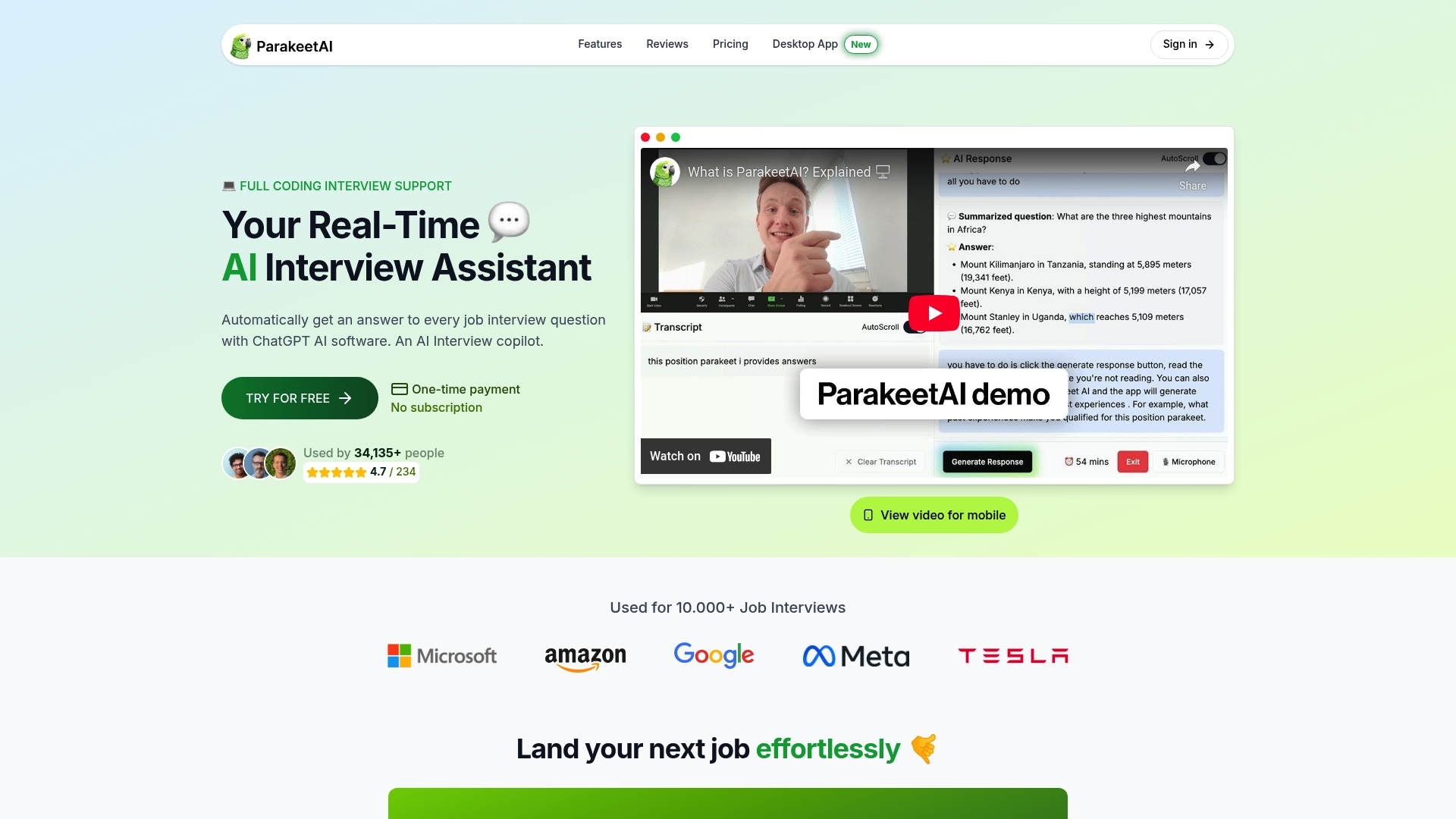Understanding Why Automated Interview Tools Matter

Automated interview tools are changing the way companies hire new talent. Companies can now use AI to screen hundreds of applicants at lightning speed and sift through data that once took weeks to process. But most people miss the real kicker. Businesses that use these tools cut up to 70 percent off their initial screening time. That means less time shuffling through résumés and more time actually finding the perfect fit—and that small detail is quietly rewriting the rules of hiring.
Table of Contents
- What Are Automated Interview Tools?
- The Importance Of Automated Interview Tools In Hiring
- How Automated Interview Tools Function
- Benefits Of Using Automated Interview Tools
- Key Considerations For Implementing Automated Interview Tools
Quick Summary
| Takeaway | Explanation |
|---|---|
| Automated tools enhance recruitment efficiency. | These tools significantly reduce initial screening times by streamlining candidate evaluations, allowing recruiters to focus on strategic tasks. |
| Standardization minimizes bias in hiring. | By ensuring consistent evaluation criteria, automated tools help eliminate human biases present in traditional recruitment processes. |
| Data-driven insights improve candidate assessments. | Advanced analytics provide deeper insights into candidate potential, enabling more informed and objective hiring decisions. |
| Challenges require careful implementation considerations. | Organizations must assess their technology infrastructure and address ethical concerns before adopting automated interview tools. |
| Training fosters effective tool integration. | Comprehensive training for hiring managers is essential to maximize the benefits and understanding of automated interview technologies. |
What are Automated Interview Tools?
Automated interview tools are sophisticated software solutions designed to transform traditional recruitment processes by leveraging artificial intelligence and machine learning technologies. These advanced platforms streamline candidate screening, assessment, and evaluation by automating various stages of the interview process.
Core Functionality of Automated Interview Tools
At their core, automated interview tools perform multiple critical functions that help organizations make more efficient and data-driven hiring decisions. These platforms typically combine video recording capabilities, natural language processing, and advanced analytics to assess candidate responses.
The primary functions include:
- Standardized Assessment: Creating uniform interview experiences by asking consistent questions to all candidates
- Performance Evaluation: Analyzing verbal and non-verbal communication cues
- Skills Matching: Comparing candidate responses against predefined job requirements
Technical Mechanisms Behind Automated Interviews
Modern automated interview tools utilize complex algorithms that can evaluate multiple dimensions of a candidate’s performance. According to research from MIT Technology Review, these tools can analyze speech patterns, facial expressions, vocabulary usage, and emotional intelligence with remarkable precision.
The technological framework involves several sophisticated components:
- Advanced speech recognition software
- Machine learning models trained on thousands of interview interactions
- Sentiment analysis algorithms
- Natural language processing techniques
By integrating these technologies, automated interview platforms provide recruiters with comprehensive insights that go beyond traditional resume screening.
The table below outlines the core technical mechanisms that power automated interview tools, helping readers understand the main technologies behind these innovative platforms.
| Technical Mechanism | Function in Automated Interviews |
|---|---|
| Speech Recognition Software | Captures and interprets spoken candidate responses |
| Machine Learning Models | Learn from thousands of interview interactions to improve evaluation accuracy |
| Sentiment Analysis Algorithms | Assess emotional tone and communication style |
| Natural Language Processing | Analyzes vocabulary, complexity, and understanding in candidate responses |
| Facial and Non-Verbal Analysis | Evaluates expressions and body language for additional candidate insights |
They help eliminate human bias, reduce time-to-hire, and create more objective candidate evaluation processes.
Understanding these tools is crucial for modern organizations seeking to optimize their recruitment strategies and identify top talent more efficiently.
The Importance of Automated Interview Tools in Hiring
Automated interview tools have emerged as a transformative solution addressing critical challenges in modern recruitment processes. These advanced technologies provide organizations with unprecedented capabilities to identify, assess, and select top talent more efficiently and objectively.
Addressing Modern Recruitment Challenges
Traditional hiring methods are increasingly inadequate in managing high-volume recruitment scenarios. According to McKinsey Global Research, companies receive an average of 250 applications per job opening, making manual screening extremely time-consuming and prone to human bias.
Automated interview tools help organizations overcome these challenges by providing:
- Rapid candidate screening and evaluation
- Consistent assessment criteria
- Reduced human bias in initial selection processes
- Enhanced candidate experience through standardized interactions
Strategic Benefits for Organizations
Beyond operational efficiency, automated interview tools offer strategic advantages that fundamentally transform talent acquisition. By leveraging artificial intelligence and machine learning, these platforms enable recruiters to make more informed, data-driven decisions.
To help clarify the unique advantages of automated interview tools, the table below summarizes the key strategic benefits these platforms deliver to organizations.
| Strategic Benefit | Description |
|---|---|
| Predictive Performance Analysis | Uses algorithms to accurately forecast candidate potential based on response patterns |
| Scalable Recruitment | Enables simultaneous assessment of large candidate pools, reducing bottlenecks |
| Cost Reduction | Decreases resources and time spent on manual initial screening |
| Consistent Assessment Criteria | Applies uniform evaluation standards across all applicants for increased fairness |
| Data-Driven Decision Making | Leverages analytics to provide actionable insights for better hiring outcomes |
Key strategic benefits include:
- Predictive Performance Analysis: Advanced algorithms can predict candidate potential more accurately
- Scalable Recruitment: Ability to process large numbers of candidates simultaneously
- Cost Reduction: Minimizing time and resources spent on initial screening stages
Learn more about our AI-powered interview assistant that revolutionizes candidate evaluation processes. By integrating cutting-edge technology with human insights, automated interview tools represent the future of intelligent, efficient recruitment strategies.
How Automated Interview Tools Function
Automated interview tools operate through a complex ecosystem of advanced technologies that transform traditional recruitment processes. These sophisticated platforms leverage artificial intelligence and machine learning to create comprehensive candidate assessment mechanisms.
Data Collection and Processing
The initial stage of automated interview tools involves capturing candidate data through multiple input channels. According to research from the National Bureau of Economic Research, these platforms collect information through video recordings, text responses, and audio inputs.
The key data collection methods include:
- Video recording of candidate interviews
- Voice and speech pattern analysis
- Natural language processing of textual responses
- Facial expression and body language tracking
Algorithmic Assessment Techniques
Once data is collected, advanced algorithms perform intricate analysis to evaluate candidate potential. These algorithms examine multiple dimensions of candidate performance beyond traditional screening methods.
The assessment process typically involves:
- Linguistic Analysis: Evaluating vocabulary complexity and communication skills
- Sentiment Tracking: Measuring emotional intelligence and communication tone
- Competency Matching: Comparing candidate responses against predefined job requirements
Machine Learning and Predictive Modeling
Advanced automated interview tools continuously improve their assessment capabilities through machine learning. Read more about our AI interview assistant that adapts and refines its evaluation techniques with each interaction. By processing thousands of interview interactions, these systems develop increasingly sophisticated predictive models that help organizations make more informed hiring decisions.
Benefits of Using Automated Interview Tools
Automated interview tools represent a significant technological advancement in recruitment strategies, offering organizations comprehensive advantages that transform traditional hiring processes. These innovative platforms deliver multifaceted benefits that extend far beyond simple candidate screening.

Efficiency and Time Management
In the competitive talent acquisition landscape, time is a critical resource. According to Harvard Business Review research, companies using automated interview tools reduce their initial screening time by up to 70%, enabling recruiters to focus on high-value strategic tasks.
Key efficiency benefits include:
- Simultaneous processing of multiple candidate interviews
- Instant candidate evaluation and ranking
- Elimination of manual screening processes
- Rapid identification of top talent
Objectivity and Bias Reduction
Traditional hiring processes are inherently susceptible to unconscious human biases. Automated interview tools introduce a data-driven approach that minimizes subjective decision-making and promotes fair candidate assessment.
Objectivity is enhanced through:

- Standardized Evaluation Criteria: Consistent scoring across all candidates
- Anonymized Initial Screening: Reducing demographic bias
- Quantifiable Performance Metrics: Measuring candidates against objective benchmarks
Strategic Talent Acquisition
Explore our advanced AI interview solutions that transform recruitment from a transactional process to a strategic organizational capability. By leveraging sophisticated algorithms and machine learning, automated interview tools provide deep insights into candidate potential, enabling companies to make more informed, forward-looking hiring decisions that align with long-term organizational goals.
Key Considerations for Implementing Automated Interview Tools
Successful integration of automated interview tools requires strategic planning and thoughtful implementation. Organizations must approach this technological transformation with a comprehensive understanding of both its potential benefits and potential challenges.
Technical Infrastructure and Compatibility
Before adopting automated interview tools, companies must carefully assess their existing technological ecosystem. According to Gartner Research, successful implementation depends on seamless integration with existing human resources management systems.
Critical technical considerations include:
- Compatibility with current recruitment software
- Data security and privacy infrastructure
- Scalability of the technological solution
- Integration capabilities with existing HR platforms
Ethical and Legal Compliance
Automated interview tools introduce complex ethical considerations that organizations must proactively address. Transparency and fairness become paramount when implementing AI-driven recruitment technologies.
Key ethical and legal aspects to evaluate:
- Algorithmic Bias Detection: Ensuring non-discriminatory assessment processes
- Candidate Consent Mechanisms: Obtaining clear permissions for AI-based evaluations
- Data Protection Regulations: Compliance with regional privacy standards
- Algorithmic Accountability: Maintaining human oversight in decision-making
Training and Organizational Adaptation
Discover strategies for successful AI interview tool implementation that focus on human-technology collaboration. Effective deployment requires comprehensive training programs that help recruiters and hiring managers understand how to leverage these advanced tools effectively. Organizations must develop a cultural mindset that views automated interview tools as enhancement technologies rather than replacement mechanisms, fostering an environment of continuous learning and technological adaptation.
Experience the Future of Interview Success—AI Support When You Need It Most
If you are feeling overwhelmed by the time and pressure of modern hiring, you are not alone. The article highlights how manual interview processes can be exhausting, lead to bias, and leave you struggling to stand out. Automated interview tools are reshaping hiring with standardized assessment and real-time feedback, but many job seekers still worry about keeping up or answering tough questions under pressure.

Imagine having a real-time AI job interview assistant that listens during your interview and instantly provides the best answers for every question. It is not just about convenience—it is about gaining the confidence and edge you need right now. Visit https://parakeet-ai.com to see how our AI technology brings you closer to your career goals. Do not let another opportunity pass you by—try our smart interview solutions today and excel where it matters most.
Frequently Asked Questions
What are automated interview tools?
Automated interview tools are software solutions that leverage artificial intelligence and machine learning to streamline the recruitment process by automating candidate screening, assessment, and evaluation stages.
How do automated interview tools improve hiring efficiency?
These tools enhance hiring efficiency by allowing for simultaneous processing of multiple candidate interviews, reducing initial screening time by up to 70%, and providing instant evaluation and ranking of candidates.
What are the main benefits of using automated interview tools?
The key benefits include increased efficiency and time management, reduced unconscious bias in candidate assessments, and enhanced strategic talent acquisition by providing deep insights into candidate potential.
How do automated interview tools address ethical concerns?
Automated interview tools can address ethical concerns by implementing algorithmic bias detection, ensuring transparency in AI evaluations, obtaining candidate consent for assessments, and complying with data protection regulations.




